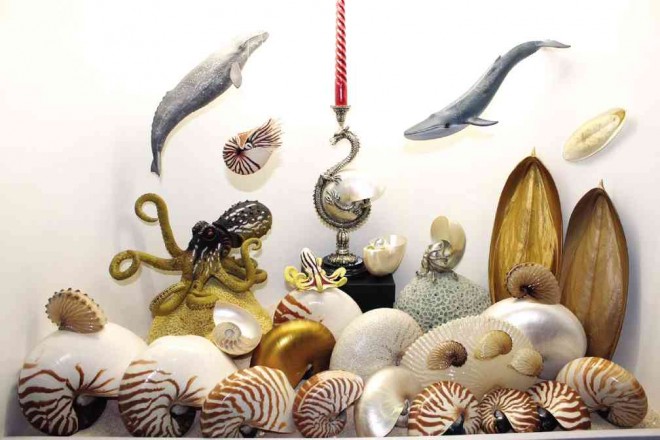Many-chambered mansion
The Nautilus is a marine animal that is closely related to squids and octopi, except that it is enclosed in a shell that is divided internally into a series of progressively larger and larger chambers.
The mollusk occupies the last and largest of these cells. As the animal develops and matures, it outgrows its former dwelling. It then builds a new and more spacious chamber into which it transfers, after sealing off the space it has vacated with a thin partition called a septum.
The series of septa are pierced and traversed in the middle by a long and thin extension of its fleshy body called the siphuncle.
The empty chambers contain a gas that the nautilus regulates and controls, enabling it to ascend or descend at will to different depths in the ocean.
Nautili move with surprising speed and agility by ejecting a jet of water through the funnel that protrudes beneath its head. Thus, they are able to swim and sail the seas, exactly like their free-swimming cousins, the squids and octopi, yet so unlike their shelled, seabed-bound relatives such as the whelks, tritons and conches.
A nautilus’ mouth is surrounded by two rings of about 90 short and sucker-free tentacles. Its eyes are not as good as those of squids and octopi.
The mollusk proliferates in the warm tropical waters of the western Pacific and Indian Oceans.
Most of the species we see today in fossil form have long been extinct but there are quite a few organisms that have survived the relentless onslaught of time and continue to exist unchanged, still in the original forms of millions of years ago. They are aptly called “living fossils.”
One such evolutionary success story is that of the chambered nautilus, a virtual “missing link” between the large family of shelled mollusks called gastropods and the equally big, wide-spreading family of cephalopods to which squids and octopi belong.
The nautilus is a master of adaptation, managing to incorporate the best of both Molluscan worlds—possessing a hard and durable shell that gives it safety and security while, at the same time, having the ability to move over long distances in the open seas. It is a Sinbad clad in the armor of a knight!
Oliver Wendell Holmes sang the praises of this cold and slimy animal in his famous poem “The Chambered Nautilus.” He drew a correlation between the life of the nautilus and his own life and spiritual aspirations.
Calling it “the ship of pearl” and “venturous bark (boat or sailing vessel),” Holmes invested the nautilus with a human quality and characteristic, connecting what it was to what humans like us went through in life and to what we aspired to achieve—“to leave the past, to build more stately mansions, to be free.”
The nautilus teaches us lessons in persistence, tenacity and resolution. We, too, are “children of the wandering sea,” but that should not deter us from escaping the fossilized structure of our past lives, nor stop us from evolving into the best that we can be.
We have to throw overboard the emotional baggage that is our “low-vaulted” past to be free to sail the seven seas.
We should strive to build for ourselves bigger and better mansions where our restless souls can find rest and peace till at length we are returned to the stars, to that many-chambered mansion in the sky that the Father of us all built for us, to house our souls!
The author is the academic supervisor at Marian School of Quezon City and curator of the school’s Museum of Rocks and Shells.
E-mail him at [email protected].















